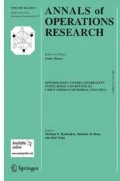Abstract
In this paper, a new class of minimax programming problems is considered in which the functions involved are E-differentiable. The so-called parametric and nonparametric necessary E-optimality conditions are derived for the considered E-differentiable minimax programming problem. Further, sufficient optimality conditions are established for such nondifferentiable extremum problems under E-convexity hypotheses. Moreover, the example of a nonsmooth minimax programming problem with E-differentiable functions is given to illustrate the aforesaid results. Furthermore, the so-called Mond-Weir E-dual problem and Wolfe E-dual problem are defined for the considered E-differentiable minimax programming problem and several E-duality theorems are established also under appropriate E-convexity hypotheses.
Similar content being viewed by others
References
Antczak, T., & Abdulaleem, N. (2019). \(E\)-optimality conditions and Wolfe \(E\)-duality for \(E\)-differentiable vector optimization problems with inequality and equality constraints. Journal of Nonlinear Sciences and Applications,12, 745–764.
Antczak, T. (2004). Minimax programming under \((p, r)\)-invexity. European Journal of Operational Research, 158, 1–19.
Antczak, T. (2011). Nonsmooth minimax programming under locally Lipschitz \(\left( \Phi,\rho \right) \)-invexity. Applied Mathematics and Computation,217, 9606–9624.
Antczak, T. (2013). A lower bound for the penalty parameter in the exact minimax penalty function method for solving nondifferentiable extremum problems. Journal of Optimization Theory and Applications,159(2), 437–453.
Ahmad, I., Husain, Z., & Sharma, S. (2008). Second-order duality in nondifferentiable minmax programming involving type-I functions. Journal of Computational and Applied Mathematics,215(1), 91–102.
Bazaraa, M. S., Sherali, H. D., & Shetty, C. M. (2006). Nonlinear programming: theory and algorithms. New York: Wiley.
Bector, C. R., & Bhatia, B. L. (1985). Sufficient optimality conditions and duality for a minimax problem. Utilitas Mathematica,27, 229–247.
Bector, C. R., Chandra, S., & Husain, I. (1992). Sufficient conditions and duality for a continuous-time minmax programming problem. Asia-Pacific Journal of Operational Research,9, 55–76.
Bector, C. R., Chandra, S., & Kumar, V. (1994). Duality for minmax programming involving \(V\)-invex functions. Optimization,30, 93–103.
Chew, K. L. (1984). Pseudolinear minimax programs. Asia Pacific Journal of Operational Research, 1, 53–64.
Chuong, T. D. (2017). Nondifferentiable minimax programming problems with applications. Annals of Operations Research,251(1–2), 73–87.
Cherkaev, E., & Cherkaev, A. (2008). Minimax optimization problem of structural design. Computers & Structures,86(13–14), 1426–1435.
Danskin, J. M. (1967). The theory of max-min and its application to weapons allocation problems. New York: Springer.
Demyanov, V. F., & Malozehon, V. N. (1974). Introduction to minmax. New York: Wiley.
Du, D. Z., & Pardalos, P. M. (Eds.). (1995). Minimax and applications. Dordrecht: Kluwer Academic Publishers.
Deng, X. T., Li, Z. F., & Wang, S. Y. (2005). A minimax portfolio selection strategy with equilibrium. European Journal of Operational Research, 166, 278–292.
Husain, Z., Jayswal, A., & Ahmad, I. (2009). Second order duality for nondifferentiable minimax programming problems with generalized convexity. Journal of Global Optimization,44(4), 593–608.
Jayswal, A., & Stancu-Minasian, I. (2011). Higher-order duality for nondifferentiable minimax programming problem with generalized convexity. Nonlinear Analysis,74(2), 616–625.
Khan, M. A. (2016). Optimality conditions and duality for nonsmooth minimax programming problems under generalized invexity. Filomat,30, 1253–1261.
Kailey, N., & Sharma, V. (2016). On second order duality of minimax fractional programming with square root term involving generalized \(B-(p, r)\)-invex functions. Annals of Operations Research,244(2), 603–617.
Lai, H. C., & Huang, T. Y. (2009). Optimality conditions for a nondifferentiable minimax programming in complex spaces. Nonlinear Analysis,71(3–4), 1205–1212.
Liu, X., Yuan, D., & Dan, Qu. (2013). Minimax programming with \( \left( G,\alpha \right) \)-invexity. Journal of Nonlinear Analysis and Optimization,4, 173–180.
Mehra, A., & Bhatia, D. (1999). Optimality and duality for minmax problems involving arcwise connected and generalized arcwise connected functions. Journal of Mathematical Analysis and Applications,231, 425–445.
Mishra, S. K., & Shukla, K. (2010). Nonsmooth minimax programming problems with \(V\)–\(r\)-invex functions. Optimization, 59(1), 95–103.
Mishra, S. K., Wang, S., & Lai, K. K. (2007). Minimax programming under generalized \((p, r)\)-invexity. Journal of System Science & Complexity,20, 501–508.
Mond, B., & Weir, T. (1991). Sufficient optimality conditions and duality for pseudoconvex minimax problem. Cahiers, du-Centre d’Etudes de Recherch Operationnelle,33, 123–128.
Megahed, A. A., Gomma, H. G., Youness, E. A., & El-Banna, A. H. (2013). Optimality conditions of \(E\)-convex programming for an \(E\)-differentiable function. Journal of Inequalities and Applications,2013(1), 246.
Rivaz, S., & Yaghoobi, M. A. (2013). Minimax regret solution to multiobjective linear programming problems with interval objective functions coefficients. Central European Journal of Operations Research,21(3), 625–649.
Stefanescu, M. V., & Stefanescu, A. (2007). Minimax programming under new invexity assumptions. Revue Roumaine Mathematiques Pures et Appliquees,52, 367–376.
Weir, T. (1992). Pseudoconvex minmax programming. Utilitas Mathematica,42, 234–240.
Wang, S. Y., Yamamoto, Y., & Yu, M. (2003). A minimax rule for portfolio selection in frictional markets. Mathematical Methods of Operations Research,57, 141–155.
Youness, E. A. (1999). \(E\)-convex sets, \(E\)-convex functions, and \( E \)-convex programming. Journal of Optimization Theory and Applications,102(2), 439–450.
Zalmai, G. J. (1987). Optimality criteria and duality for a class of minmax programming problems with generalized invexity conditions. Utilitas Mathematica,32, 35–57.
Zalmai, G. J. (2003). Parameter-free sufficient optimality conditions and duality models for minmax fractional subset programming problems with generalized \((F,\rho,\theta )\)-convex functions. Computers & Mathematics with Applications,45, 1507–1535.
Zhou, H., & Sun, W. (2003). Optimality and duality without a constraint qualification for minimax programming. Bulletin of the Australian Mathematical Society,67, 121–130.
Žaković, S., Pantelides, C., & Rustem, B. (2000). An interior point algorithm for computing saddle points of constrained continuous minimax. Annals of Operations Research,99(1–4), 59–77.
Žaković, S., & Rustem, B. (2003). Semi-infinite programming and applications to minimax problems. Annals of Operations Research, 124(1–4), 81–110.
Author information
Authors and Affiliations
Corresponding author
Additional information
Publisher's Note
Springer Nature remains neutral with regard to jurisdictional claims in published maps and institutional affiliations.
Rights and permissions
About this article
Cite this article
Antczak, T., Abdulaleem, N. E-differentiable minimax programming under E-convexity. Ann Oper Res 300, 1–22 (2021). https://doi.org/10.1007/s10479-020-03925-w
Accepted:
Published:
Issue Date:
DOI: https://doi.org/10.1007/s10479-020-03925-w


